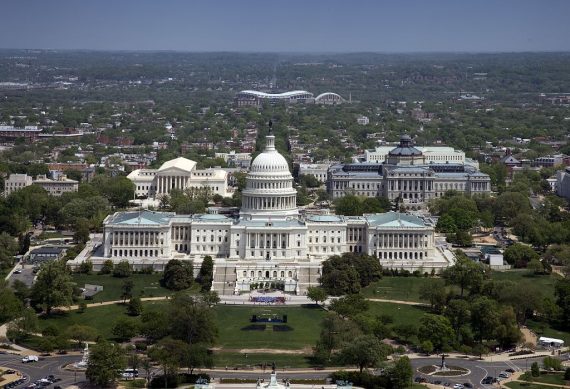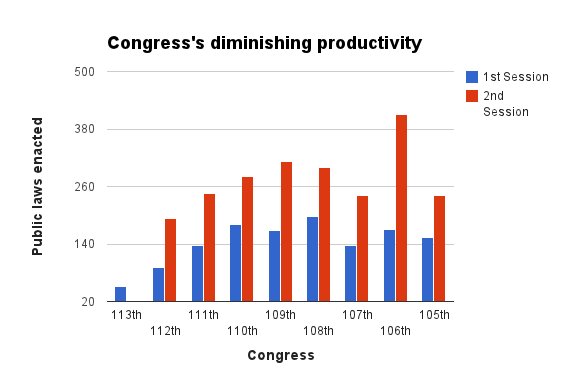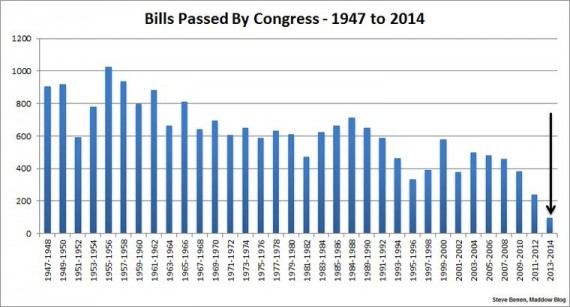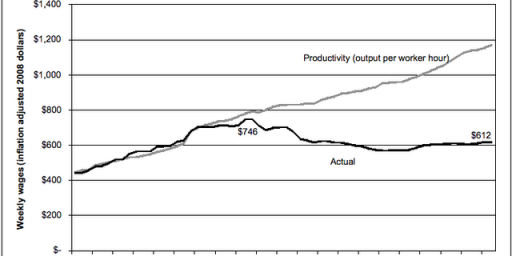113th Congress Set To Be Least Productive In History, But Is That A Bad Thing?
The current Congress is on pace to pass fewer laws and bills than any since the end of World War II. That's not necessarily a bad thing.
The 113th Congress is on pace to become the least productive in history according to The Fix, assuming you think productivity is measured by how many laws are passed:
Here’s President Obama at a fundraiser Wednesday night for the Democratic Congressional Campaign Committee in Houston, Texas: “This has become the least productive Congress in modern history, recent memory. And that’s by objective measures, just basic activity.”
So, is he right? And, if he is, so what?
We’ve written extensively on the productivity debate in this space. So, let’s start with the facts first. And the facts are these: In terms of actual laws or bills passed, the 113th Congress is headed toward historic levels of unproductivity.
In support of the position, there’s this chart, which shows that, so far, Congress has only passed 23 bills that have become laws:
Or, to make the measure a little more broad, there’s this chart, which shows that the number of bills passed by Congress is on a pace to be the lowest since the Congress elected in the 1946 elections:
When you look at the raw numbers then, there seems to be some support for the Presidents assertion about Congress’s lack of productively. At the same time, though, it’s pretty clear that the entire idea of Congressional “productivity” is a loaded term. President Obama, for example, can claim that the Republican House has been unproductive since it has failed to enact his agenda on issues ranging from “job creation” via more government spending, immigration, or the minimum wage. Conversely, House Republicans would claim that the very act of blocking an agenda that they believe is bad for the country and the economy is, in some sense of the word, productive and that it is the Democratic controlled Senate that is being “unproductive” by failing to act at all on countless numbers of bills that have passed the House of Representatives only to languish in the Senate due to inaction by the Democratic majority.
Last year, Shawn Ryan, Press Secretary to Ohio Congressman Jim Renacci wrote a very good push back against the idea that productivity should be measured by the number of bills or laws passed:
However, I also think it’s important to note that “productive” is a relative term. A small government conservative or a libertarian might argue that the Congress that legislates least, governs best. In other words, just because we aren’t passing legislation doesn’t mean we aren’t being productive.
For example, the Administration has had [to] go around Congress in an attempt to put its environmental agenda in place (admittedly, that is something it probably would have had to do even with Democratic majorities in both chambers, but they have more political cover going around a Republican controlled House). That puts those policies on much rockier legal standing, assuming they can be implemented solely through the regulatory side at all. That’s a good thing if you disagree with those environmental policies and that outcome is the direct result of Congressional inaction.
It makes sense, of course, that a Republican Hill Staffer would defend a Republican House, but I think Ryan’s point has a great deal of merit. Using a metric like the number of laws or bills passed by Congress as the metric to determine whether or not that Congress has been “productive” is, in the end, ideologically biased because it assumes without question that passing bills and laws is an inherently good thing. As Ryan notes, there are plenty of people who would take issue with that idea. So, in some sense, it isn’t surprising that a Congress where Republicans have significant control over the agenda is one that would see fewer laws passed. Whether the lack of Congressional action, in and of itself, is a good thing or a bad thing depends entirely on the ideological biases of the person using the term. Much harder, indeed impossible, to measure objectively is whether or not the bills that Congress is actually passing will be positive for the nation and the economy. So, yes, President Obama is right that Congress is being “unproductive,” but that’s only true if you accept his definition of the term.









Sure, lets just abdicate power to our 1%/corporate overlords. Because power does not vanish, it’s just a question of who wields it and what the agenda is.
Good idea.
Except we can look back at recent history to the 108th-109th Congresses, both of which had Republican majorities, and see them passing plenty of legislation. It’s only “ideologically biased” now since Republicans have been hell-bent on stopping any of Obama’s agenda, and that means blocking bills instead of passing them.
And the definition of most scholars of Congress, but hey, score one against the president, right?!
Furthermore, Mr. Mataconis, a libertarian Congress would want to pass plenty of repeal legislation if they were intent on dismantling big government. That would count as “laws passed.” Their argument is a sham since it belies what they’d do if they actually had control.
If the GOP takes the Senate next year and suddenly Congress becomes more “productive” in this capacity, I reserve the right to say I told you so.
Passivity and inaction simply cedes the playing field to the President. Renacci’s wrong. What an awful rationalization for what’s essentially laziness.
@Tillman: Again, we’re on the same page.
I read:
And immediately thought, “Not sure it’s a good thing that we have a Congress with their thumb up their ass. There’s a lot of bad laws they could be fixing.
Example: In my state (CO), the legislature is working on a law that bans all “automated traffic enforcement devices,” you know, red-light cameras and photo radar. The weird thing is that is has bi-partisan support. It’s not going to be useful in any campaign ads and it might actually hurt fundraising-wise. (At least when it comes to donations from the “traffic enforcement device” lobby.)
But it’s good for the people. Where is that spirit in the US congress?
My biggest problem with the metric is that there are two fundamental categories of laws to be passed by Congress. There are “Laws that Change Things” — the ACA, the Brady Act, the Defense of Marriage Act, etc. — and there are “Maintenance Laws” like the various annual budgets. The last two Congresses have been extraordinarily poor at maintenance, which does harm disproportional to the raw number of laws not passed by sabotaging executive and judicial operations.
My second-biggest problem with the metric is that it does not measure in any way the mischief value of frivolous Congressional ‘investigations’ such as the infamous baseball steroids episode, or failure to confirm of executive and judicial appointments, etc. This causes further sabotage to the running of the country; the more Congress investigates and argues, the less they (and everyone else) get done. This Congress has been a top offender in this category as well.
No, it doesn’t.
The most glaring of numerous examples is global warming. It’s real and it’s going to cause great harm. It’s going to hurt the Koch Bros grandsons as well as mine. It requires a huge act of ideologically motivated reasoning to believe otherwise. Failing to act is simply stupid.
Chris Mooney, in The Republican Brain observes that everybody engages in motivated reasoning, but liberals are better able to get past it. There are days, Doug, I have to ask whether conservatives even believe there is such a thing as objective reality? Is everything faith?
Who is the least productive congressman / congresswoman? One that writes/sponsors the least number of bills and or who has have never wrote bills that became law? Or least attentive when it comes to voting in the house?
is there a website that tracks stuff like that?
Believing Basic Science is an ideological bias that many in the GOP don’t have.
@DrDaveT:
I’m actually not positive on this. Congressmen can be busy bees with committee and subcommittee meetings, but the leadership of each chamber schedules votes and whips members to attend them. I don’t think we’re being deluged with investigations so much as the leadership has no clue on any sort of agenda besides “oppose anything Democrats support.”
I somewhat agree with you, Doug, that a busy Congress is not necessarily a good Congress. Given some of the laws the House has proposed, like repealing Obamacare, I would think that liberals would be delighted that this Congress isn’t able to accomplish anything. Blocking agendas goes both ways.
That having been said, there are serious problems in this country that it should be easy to get a bipartisan consensus about. Tax reform would be near the top of my list. Regulatory reform would also be on there. Almost everyone, even conservatives, acknowledges that our immigration system is broken. The fact is that laws becomes outdated, regulations and bureaucracies become bloated. Even in a libertarian paradise, you would need to periodically rework the laws and the government organization to keep it functioning.
A big problem right now is that we haven’t done that basically since the Clinton Administration. You would think fixing the hundreds of billions in economic drag of tax code and regulatory cruft would be something even Republicans could get behind.
@Hal_10000:
There’s a problem there, though. The Grover Norquist party has no interest in ‘reforming’ either the tax code or federal regulation of business, if by ‘reforming’ you mean “redesigning it to serve its intended function more efficiently and effectively”. They reject the missions entirely. (This can be easily seen by the persistent underfunding of IRS collection efforts and EPA oversight.)
They don’t want to fix those activities; they want to cripple or eliminate them.
i think we have more than enough laws already, now if they could work on the tax code- that would be something.
@Hal_10000: And they will be in favor of it–as soon as the knee guard won’t get any credit for doing it!
No it is not necessarily a bad thing. It means no new taxes, fees, regulations, or bridges to no where. But the bad part is that they could be working on tax reform (flat tax or sales tax), government reform (eliminate or combine many agencies), reduce taxes on middle class workers, do away with many of the useless and wasteful regulations on private businesses and individuals. They could develop a plan to modernize the aging, vulnerable electrical grid that could cause a catastrophe. ( this is scary: http://www.dailymail.co.uk/news/article-2530879/FBI-investigates-military-style-attack-California-power-station.html). Crazy government regulations site: http://wastefraudandabuse.org/stupid-epa-regulations/
And the state/local governments are just as bad if not worse. One city in Georgia prohibits home gardens in the city limits !!
While we are here, beef prices are soaring. I do not eat much beef at all, but for those who love those steaks and hamburgers: get a large freezer if you don’t already have one.
The present Congress is unproductive because, frankly, that’s what the voters wanted. Lets not forget that the Republican House majority is a result of a 2010 wave election in which older, white conservative voters sent a huge number of legislators to Congress with one mission : stop that crazy black man in the White House from doing anything that might discomfort them -and roll back what he already did (Obamacare). Not surprisingly, the current Congress is very good at stopping Obama from doing anything. But they are not so good at doing anything positive. And make no mistake, there are things be done.
I don’t think that tax cuts-the perennial conservative favorite, euphemistically called “tax reform” is really all that important right now. There are other issues-comprehensive immigration reform, climate change, how to deal with Putin.
But immigration reform is a nonstarter, because the 2010 crowd really doesn’t want immigration reform – they simply want to send all the illegals home and to put up a big wall on the southern border.
As for climate change, some of the Republican members of the House Committee on Science believe that evolution is a lie, that the earth is 6000 years old, and that climate change is a hoax. Such people simply aren’t going to pass meaningful climate change legislation.
Bottom line, the current Congress is simply not one that it set up to pass meaningful legislation. Unfortunately, the 2014 elections will not change this. As long as the current Republican Party retains a House majority, no meaningful legislation will pass. That means that we won’t see anything pass in 2015 or 2016, either.
Most of the political pundits see this, which is why they are looking to 2016 and are hoping for a wave election to break the gridlock.
@stonetools: stop it, bring some facts if you’re really going to accuse congressmen of really believing the earth is 6k… and that everyone’s against the “black man” …..that’s beyond tired. when you attack the religious faction you should be aware that the black voting block is the most religious- so you’re putting down blacks!
last i heard the vast majority of this country do not like obmacare or trust the guy behind it. if anything they gave him more latitude because of his chosen color.
Except for that stuff where this “least productive Congress” shut down the government and was willing to leverage demands of conservative members in The House against a default on federal securities – I guess that being non-productive was a good thing.
In fact, congressional conservatives now consider that productivity equals: (1) voting approximately 50 times to rescind ACA, (2) refusing to authorize Obama to take action with respect to Syria (then complaining that Putin took the lead there), and (3) continuing to “investigate” Benghazi in the hope that they can come up with something that at least appears to justify an impeachment of the president if the GOP can retake the Senate in 2014.
@bill:
I was unaware that religious Blacks were actually evangelical White Christians?